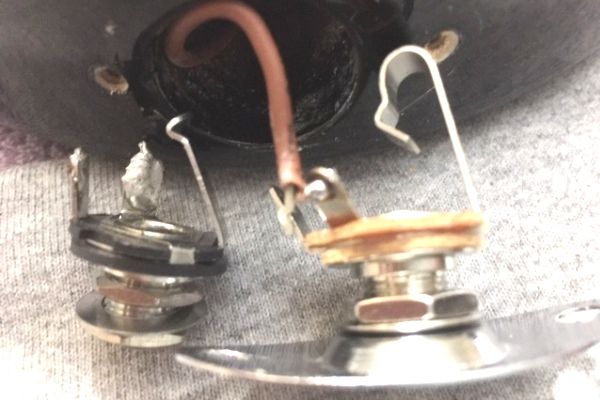I recently bought a used bass, an ibanez soundgear that has active pickups and I didn't bother to test it before I bought it.Turns out when you plug it in that when you turn the knobs you get some static, the volume kind of decreases until it cuts out and I have to push the jack for it to come back again.There's also a slightly distorted sound as it dies out.I tried replacing the battery but it didn't help.Any advice on how to solve this would be greatly appreciated.
Ibanez Soundgear - nice choice! There could be one or more causes. I would go down this path (assuming you know how to solder).
1. Change out the input jack to Switchcraft or AllParts jack. Should cost just a few bucks and take you about 15 minutes. The innermost lug is the ground, and the outermost lug is the hot lead. With this done you will know that you have a good, solid connection. The attached pic will help you to understand the quality difference in stock vs. replacement.
Check your results and stop/proceed as needed
2. It sounds like your pots (potentiometers) are the real problem. As needed, replace with 250k pots using a top brand such as CTS Emerson DiMarzio. Pots should cost around $7 each. Pay very close attention to the wiring configuration and order of washers/nuts. Replace only one at a time so you don't get overwhelmed with all of the wirings.
The particulars with pots/caps that you need to watch are:
1. Diameter of the shaft - avoid needing to enlarge holes in your instrument & make certain your knobs will fit the posts.
2. Depth of cavity being sufficient for new pots (this is primarily for going from micro-pots to full-size pots)
3. Capacitors can probably be reused. Make certain you know EXACTLY how they are connected.
USEFUL TIPS
1. Always use a smartphone to take numerous close-up, clear, detail photos of wiring, positioning, etc. You will find this to be extremely useful reference info if you get confused on how things were setup.
2. Always cover adjacent work areas. NEVER solder directly over an exposed guitar body to avoid damaging the finish.
3. If you're ever feeling overwhelmed get in touch with a local guitar shop for professional help.
The real secret to a happy life is making good decisions.


